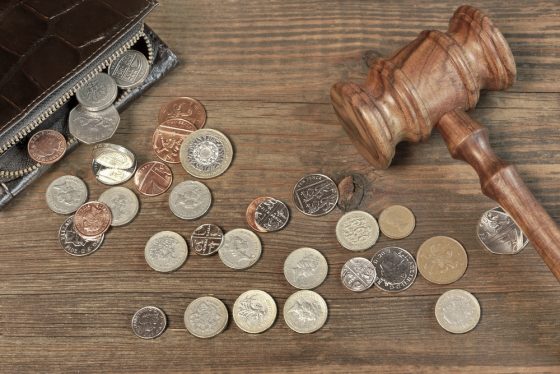How A Tax Lien Affects Your Financial Health
Most people prefer to avoid trouble with the IRS and make sure to pay their tax bill on time. Sometimes, happenings beyond our control can prevent this from occurring. Often, this is because the IRS sends the bill to the wrong address or the funds simply aren’t available. This can be due to a job loss, a surprise bill, or a number of other incidents in life. The IRS has access to an array of avenues to collect the income tax you owe. They may do a wage garnishment or levy your bank account. They also have the option of staking a claim on your property; this is called a tax lien. Want to know more?
Tax Lien Basics
The good news is that a lien is not often the first step in the collection process. The IRS must properly determine how much you owe. They send a bill to advise you of your liability and provide payment instructions. This is a Notice and Demand For Payment. If the bill isn’t fully settled by the deadline, the past-due debt results in the IRS filing a Notice of Federal Tax Lien for many taxpayers. It notifies your creditors of the lien on your property.
Therefore, a tax lien has a serious impact on your financial health. It applies to real estate property, vehicles, business property – including accounts receivable, and securities. Contrary to popular belief, filing for bankruptcy is not a viable loophole. This is because most income tax doesn’t qualify for inclusion. In addition, the lien remains in place after a bankruptcy is discharged.
Tax Liens and Your Credit Report
Tax liens used to be a fixture on a credit report once it got there. The best-case circumstance was its removal after seven years on your credit report when the back-tax debt was paid-in-full. Unpaid liens resided there for up to 10 years. Ismat Mangla at Experian explains, “In 2017, however, all three credit bureaus implemented changes to eliminate civil judgment records (notes that a consumer owes debt to a court because of a lawsuit result) and half of all tax lien data. By April 2018, all tax liens were removed from credit reports by the bureaus.”
She also notes that the change was prompted by a Consumer Financial Protection Bureau study. It discovered alarming rates of incorrect reporting that adversely affected some people with the same names across the country. The three major credit reporting bureaus, Experian, TransUnion and Equifax, established that a change was needed in 2017. Tax liens aren’t reported on consumers’ credit reports today; therefore, they have no impact on creditors’ decisions to extend credit.
Tax Liens and Your Public Record
Tax liens do appear on your public record. They’re easy for anyone with internet access to find. You can find them by going to your state’s Secretary of State website, creating an account and conducting a search. If one wants a listing of business tax liens, he or she can do so by filing a written request and paying a fee of $130. The IRS then sends you a CD containing the taxpayer’s name, address and more.
Tax liens can be withdrawn, or removed from, your public record once the tax debt is paid in full. For taxpayers who owe less than $25,000, it may be removed if a successful payment history is established. This must be done via direct debit from your bank account. Some taxpayers may have their lien withdrawn for another reason. This can include the IRS approving an Offer in Compromise or the statute of limitations on the debt expiring.
Tax Lien Discharges
Liens and levies are often confusing to consumers. Levies apply to one asset at a time; a levy applies to things like wages or a checking account. A separate levy must be done on each asset targeted. Liens lay a blanket stake on possessions, such as a home or boat. A lien discharge means exempting one possession from the tax lien blanket.
For example, if you own a residential home, a vacation home, a car, and a boat, first of all, congratulations! You’re certainly doing well in this game of life! Second, if you’re late paying your taxes, the IRS may choose a lien as a collection effort. If so, they then own an interest in these items and can seize them to pay the debt. As a result, this makes it difficult to sell or refinance this property. The threat of having the home seized by the IRS is still present after it’s sold. If you refinance it, the new bank must accept that any funds from future transactions are going to the IRS first.
However, if you intend to refinance your home to cash out equity to pay your debt, the IRS may help. They will consider discharging your home from the lien to simplify the refinance. The IRS always has their eye on the prize, which is the collection of your past-due tax debt. Hire a tax specialist to establish the framework and submit the paperwork for a discharge for you. If you prefer to do it yourself, file one here by following the instructions here.
Tax Lien Subordination
If a discharge doesn’t make sense for your case, another option may be a request for subordination. The Internal Revenue Code lays out certain conditions that must be met for a tax lien subordination to be approved. As mentioned before, the IRS always has their eyes on the prize. That means they’ll be open to options that will allow them to collect payment before the statute of limitations expires.
Example of Tax Lien Subordination
Using the example of a residential home above, let’s discuss subordinations. If Company A loans a taxpayer money to buy a home, Company A is in first position. Company A will receive repayment first at the time of a sale or refinance of the home. That means that Company A will get paid before the taxpayer receives additional money that comes out of the transaction. If Company B extends a second loan against the home, it’s with the common awareness that it will be in second position.
At the point of a sale or refinance, Company A receives repayment first. Company B receives repayment second if there’s enough money in the transaction. A tax lien on the home lands in first position after a sale or refinance. For this reason, most banks won’t loan money to a delinquent taxpayer. That is, unless their loan rests in first position to protect their investment. A subordination changes the position of the tax lien to aid in a sale or refinance.
If the IRS understands that a subordination will help a refinance, they are more likely to approve a subordination request. This is because it allows them to collect the debt from cashed-out equity. Often, this may occur if there’s no equity, but the refinance will lower the interest rate on the mortgage. The monthly savings can result in the potential of the taxpayer to make monthly installment payments on their back-tax debt. The IRS is likely to agree to the arrangement if the savings results in a sufficient monthly installment payment.
Removing a Tax Lien
Once the IRS has filed a tax lien on your property, options for removal become extremely limited. The lien can only be removed once the debt is paid in full. However, arranging to make payments on the debt can play a role in removing it. This may be an approved Offer in Compromise or agreement on a satisfactory installment agreement. Other exceptions often apply in certain circumstances. Consult with a tax relief specialist to understand your specific options. You may be able to get out from under a tax lien that is burdening your property.
Tax Champions has been helping taxpayers navigate their tax liens for over three decades. We have our finger on the pulse of the ever-changing tax laws and inner processes of the IRS. Call us anytime at 800.518.8964. One of our friendly and experienced staff is happy to discuss your case with you. During the phone call, we will develop a plan of action that will serve your needs.
Why Tax Champions?
Our full staff of professionals work with clients throughout the year, and are ready to start on your case now. We’re confident in our ability to secure the best possible results that our clients qualify for.
If you prefer, we’re happy to reach out to you as well. Submit your contact information to us in the blue box on the right side of this page. We’ll get back to you as soon as possible. We also have a chat feature operated by skilled staff available on this website for your convenience.
Most importantly, our clients are paramount to us. So, we encourage you to look at our A+ rating with no customer complaints at the Better Business Bureau. Give us a call today; sleep better tonight knowing that you have an experienced team working for your best results. We’re available during the day and evenings, seven days a week, including holidays. Call today.

